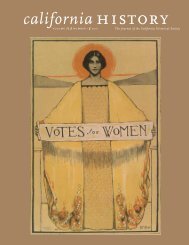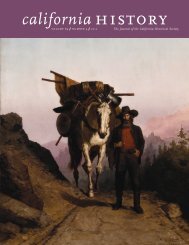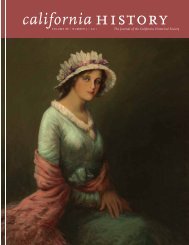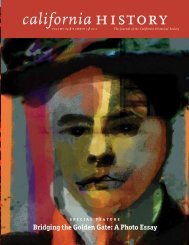Volume 90, Number 1 - California Historical Society
Volume 90, Number 1 - California Historical Society
Volume 90, Number 1 - California Historical Society
Create successful ePaper yourself
Turn your PDF publications into a flip-book with our unique Google optimized e-Paper software.
34<br />
Again, the equation of the Christian warrior and<br />
pilgrim reflected, and owed a debt to, the man on<br />
ribat. The Muslim scholar, mystic, or any other<br />
person with spiritual ambitions acquired the<br />
authority to fight for God. Once the ribat ended<br />
and his obligation was done, the special moment<br />
he occupied, no matter how holy the cause,<br />
ceased to grant spiritual advantages. In like fashion,<br />
as the council’s proviso explained, the warrior<br />
who tried to liberate his brethren in Spain<br />
or Jerusalem, and thus must wear markings to<br />
validate his mission, could slay his enemies,<br />
and presumably repent for his sins, only while<br />
he honored his commitment. Once the warrior<br />
finished his task or abandoned his calling to<br />
attack another target, the quest, like a pilgrimage<br />
that had run its course, was complete.<br />
By the fifteenth century, Christians had taken<br />
ribat and made it their own. As Kroeber hypothesized,<br />
Christians assimilated, and then transformed,<br />
their rivals’ ideas. Employing Muslim<br />
precedents, whose shape and contours now sat<br />
obscured, Christians presented their efforts to liberate<br />
Spain as a santa empresa (holy undertaking)<br />
or una santa romería (holy pilgrimage). 58 War, like<br />
a pilgrimage, retained a finite quality. Once Christians<br />
had completed their task, whether it was<br />
the attempt to liberate Spain or Jerusalem, they<br />
had fulfilled their obligation. There is no need to<br />
stretch the point and wonder if we see a Christian<br />
variation of the House of War superseded by the<br />
House of Islam, though the thought is intriguing.<br />
It is enough to say that Christians valued<br />
the process that combined war and pilgrimages.<br />
Each venture involved a journey whereby the<br />
participants proved their devotion by asking for<br />
forgiveness and performing certain duties, which<br />
included, if need be, the chance to go to battle.<br />
<strong>California</strong> History • volume <strong>90</strong> number 1 2012<br />
denoueMent<br />
We have come full circle. The ties between Muslim<br />
Spain and provincial <strong>California</strong>, especially<br />
concerning the making of war, confirm the<br />
endurance of certain habits. 59 Spanish Christians<br />
who followed Muslim ways, and their descendants<br />
elsewhere who perpetuated these patterns,<br />
bear out Kroeber’s ideas about culture. The sum<br />
of habits and routines that regulate and organize<br />
human existence, culture is far from an inert,<br />
stolid mass of behaviors that individuals cannot<br />
control. Rather, as Kroeber noted, culture may<br />
be best described as a collection of practices that<br />
individuals can choose, refine, or reject when<br />
circumstances merit. The selection of traits that<br />
constitute culture may involve ways to defeat enemies.<br />
Even when choosing habits from rivals, the<br />
members of any culture do so with the intent of<br />
ensuring their survival and prosperity. The habits<br />
that promise success, although they may emanate<br />
from a rival, strengthen and grow more rooted<br />
over time when they bring benefit. Accordingly,<br />
because the Muslim approach to war seemed<br />
superior, Christians of Spain picked through the<br />
practices of both jihad and ribat. They selected<br />
what they needed, altered the choices to their liking,<br />
and employed them when necessary.<br />
At its most basic, the Muslim legacy of mystics<br />
and scholars going to war set the example that<br />
Christians followed throughout the Spanishspeaking<br />
world. In many instances, and in cases<br />
that seemed removed from the establishment of<br />
military societies that accepted clergy, priests and<br />
monks in Spain served alongside, or replaced,<br />
knights and soldiers. As early as the tenth century<br />
in the Kingdom of León in northern Spain,<br />
monks and military men who had become<br />
“Arabicized” secured responsible positions in<br />
the church hierarchy and civil government. 60 By<br />
the twelfth century, Cistercian monks occupied<br />
an abandoned castle in the southernmost portions<br />
of the province of Castilla and assumed<br />
the role of soldiers. 61 Centuries later, in 1568,









